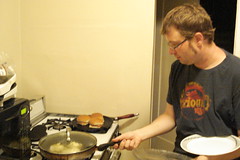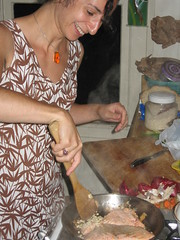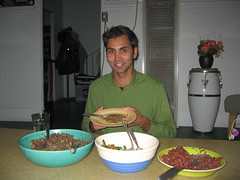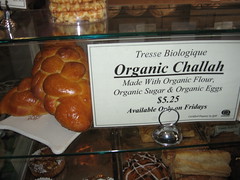Here’s my friend Brandon cooking up some fabulous bison burgers for my dinner, complete with finest Isle of Mull cheese, a cheese so strong it’s practically a heavyweight contender. Brandon’s burgers are simply a third of a pound of ground bison from our friend Kathy’s buffalo ranch. Kathy and her husband Ken own Lindner Bison and are true pioneers of highest quality grass-fed bison. Brandon’s secret is to slowly cook the pure meat patties in a pan with the lid on. When the meat is cooked, he layers slices of the cheese on top of the patties. Then he adds about a tablespoon of cold water to the pan and pops the lid back on for a minute. The steam this creates deglazes the pan and simultaneously melts the cheese to make beautifully moist and succulent patties with sticky stretchy melted cheese. Yum.
Posted on 28th May 2007 by Ysanne Spevack | Permalink |
No comments yet »
Fish is so good for you, salmon doubly so. If you’re in an area of the world where the main kind of salmon in your store is farmed, you need to choose organically farmed salmon. Choosing organically farmed fish as opposed to non-organic farmed fish is important for your family’s health, for the environment and for the welfare of the fish.
Salmon farms that aren’t organic are similar to battery farms for non-organic chickens. They suck. Over crowded and infested with sea lice, the fish are dowsed with pesticides every day because disease can spread so easily through the cramped tubs of stressed and under-exercised fish. Organic salmon farms have to allow greater space for the fish to swim, which is essential for these creatures, as they’re loners in the wild. It also means they’re less fatty and more fishy by the time they get to your pan.
I have Alaskan wild salmon frying in my pan, because wild stocks of salmon are still plentiful in these pristine glacial waters. Alaska isn’t exactly on my doorstep here in Los Angeles, but given the choice of locally farmed organic salmon and wild salmon from Alaska, I’d go for the wild option. Seeing as I’ve not actually spotted any locally farmed organic salmon, option anxiety has been avoided entirely. However, if you’re presented with the choice of organically farmed salmon or wild salmon and you’re not in California, it’s probably best to choose the organic option until you get more facts about the status of your local wild salmon stocks.
Remember, oily fish is great for your brain, for your skin, for your bones. It’s a quick supper that’s luxurious, delicious and nutritious. I’ve just pan-fried it over a low heat with garlic and fresh organic cherry tomatoes. Wish I could share it with you…
Posted on 12th May 2007 by Ysanne Spevack | Permalink |
No comments yet »
It was a pleasure to see my friend Greg Dicum on Saturday. A resident of San Francisco, Greg had traveled the 350 miles to Los Angeles to attend the Speciality Coffee Association of America‘s 19th annual conference in nearby Long Beach.
As author of ‘The Coffee Book: Anatomy of an Industry from Crop to the Last Drop,’ you can imagine just how well he was received at this event. Like a rock star emerging from a stadium after a show, Greg appeared at my friend Richard’s house, triumphant and beat, contented, excited and undeniably slightly wired. It was at that point that I learned he’d existed exclusively on coffee for the entire day.
What could a girl do but sit him down and feed him sesame and rice vinegar puy lentils, steamed ruby rice, and a big bowl of steamed French beans, fennel (anise) bulbs, carrots and garlic. Seems it was a winning combo…
Posted on 9th May 2007 by Ysanne Spevack | Permalink |
1 comment »
Religious people of all faiths are increasingly going organic, especially people whose religions state specific dietary requirements. Muslims and Jews have a particularly strong emphasis on food, with strict Halal and Kosher guidelines on food production stemming from the belief that the food we eat should be untainted, pure and spiritually uplifting. Adherents of both religions say blessings before eating the smallest morsel of food, so it seems an obvious step that with this awareness of the significance of food as God’s creation, Muslims and Jews increasingly want the food they’re blessing to be untainted by chemicals. Christians are also going organic. The Christian green movement is growing exponentially as believers are increasingly outraged at the environmentally destructive activities of the Bush administration, often in their name.
I’ve found some wonderful producers and purveyors of faith-based foods springing up, including this halal family-run company, this eco-kosher organisation in New York with an organic food outreach program, and this excellent Christian green magazine.
So it was with delight that I spotted freshly-baked, deliciously sweet and richly eggy organic challah bread in Le Pain Quotidien in Santa Monica, California. Challah is eaten every Friday night by observant Jews as part of a meal to welcome in the Sabbath with candle-lighting and wine. The plaited shape of the bread represents the many different kinds of people that make Jewish culture. It’s a cakey, slightly sweet bread that’s dense and moist. Perfect eaten in hand-torn chunks, or sliced, toasted and liberally buttered.
Posted on 1st May 2007 by Ysanne Spevack | Permalink |
2 comments »








